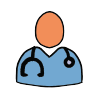Studies show that the high level of stress endured by medical students may actually hinder one’s cognitive function and learning ability. Not to mention, research reveals that 27 percent of all medical students are depressed, with 11 percent having suicidal thoughts. If the stress and depression are not managed early on, it’s likely that it will carry on into their professional careers, which can potentially lead to early burnout. No matter how many research papers you have to write or exams to study for, the number one thing on your list should be taking care of your mental health so you don’t start exhibiting self-destructive behavior.
Avoid Falling Into a Substance Abuse Trap
Between the pressures of studies and a pile of debt from tuition, it’s not uncommon for a medical student to turn to drugs and alcohol as a coping method. Nearly a third of students report alcohol abuse, with burnout and exhaustion being the main driving factors. There’s also a correlation between the type of abuse with the field of study. For example, resident surgeons tend to abuse alcohol, while those in emergency medicine also abuse benzodiazepines, cocaine, and marijuana. While the following mental health tips can help prevent an addiction, should you find yourself hooked on a substance, it’s a good idea to get treated at a facility that specifically caters to medical professionals—even if you’re still a student. Aside from the obvious reasons, it’s important to immediately address your addiction. If it continues into your professional practice, you run the risk of having your license revoked.
Take Regular Breathers
Chaining yourself to your desk isn’t going to do anything for your mental health. Schedule regular breaks throughout the day/night. Even a 30-second micro-break can increase your productivity by 13 percent, and a 15-second break from staring at your computer screen can reduce fatigue by 50 percent.
Plan Healthy Meals
Going down a junk food spiral is only going to decrease your energy and make you feel irritable, especially if you start to put on unnecessary weight. It takes little effort to open a bag of pre-washed greens and top it with a piece of lean, pre-cooked meat (think a rotisserie chicken) or can/pouch of tuna. Keep regular snacks like fruit, veggie sticks and hummus, nuts, string cheese, etc., to help curb hunger (or nerve) pangs without intaking a lot of calories.
Get Enough Sleep
While it’s going to be necessary from time to time, don’t make a regular habit of burning the midnight oil to squeeze in some extra study time because it’s only apt to hurt you in the long run. It’s been proven that lack of sleep can affect short-term and long-term memory and cause mood swings, weight gain, high blood pressure, and a risk for diabetes and heart disease. Institute time management and organizational skills like placing timed tasks in your iPhone with reminders to keep you on track.
Give Yourself a Confidence Boost
Don’t get so caught up in your studies that you forget to give yourself some props for all the hard work you’re doing. Institute confidence-boosting techniques, such as keeping a gratitude journal, being prepared as often as possible, turning a negative thought into a positive one, changing your body language, and staying away from negative people and situations.
Don’t Forget About Other Aspects of Your Life
Keep up with hobbies and personal relationships as best as you can. Retaining some semblance of balance in your life is liable to have a positive effect on your mental health, plus it can be helpful to get support from someone who’s not in your world.
Being in the medical field is a rewarding career, but in order to enjoy it to its fullest, you’ve got to make sure you’re taking care of yourself along the way. Try to see the forest through the trees in the most stressful of situations. Remember that in order to take care of others, you have to make sure you’re in good physical and mental health, too.

